
Understanding the Problem of Evil: A Theological Challenge
The problem of evil has perplexed theologians, philosophers, and laypeople for centuries. The question is simple yet profound: if a good and all-powerful God exists, why does evil exist in the world? This age-old debate was revisited in a recent video featuring Professor John Lennox and Alex O'Connor, which sparked widespread discussion on whether Lennox is merely sidestepping the harder questions or offering a deeper understanding of the problem of evil. Lennox proposes that instead of getting mired in the question of why evil exists, we should consider a different and potentially more constructive question—can we find evidence of a God who understands and shares in our suffering?
In 'Christian Professor AVOIDS the Hardest Question — Does THIS Instead', the discussion dives into the intricate problem of evil, exploring key insights that sparked deeper analysis on our end.
The Beauty and the Bombs: A Balanced Perspective
In his response, Lennox introduces the concept of living in a world filled with both beauty and bombs—a metaphor for the stunning joys and harsh realities inherent in life. This notion suggests that any worldview needs to reconcile the existence of both good and evil. For Lennox, the Christian God—who experienced suffering through Jesus Christ—profoundly engages with this dilemma. He posits that rather than moving the goalposts, he is establishing a framework that helps make sense of our existence. For anyone grappling with the question of neatly defining good and evil, this duality is crucial. It confronts us with the reality of our lived experience—where joy often coexists with pain.
What Is Theological Beauty?
The concept of beauty plays a significant role in Lennox's argument. To fully understand the problem of evil, we must first recognize the existence of beauty and goodness in our world. Lennox urges us to consider whether we can conceptualize a higher goodness if we acknowledge life's injustices. This idea draws from C.S. Lewis’s assertion that one cannot perceive a crooked line without a notion of a straight line to compare it with. Importantly, understanding this philosophical concept allows believers to engage deeply with their faith. For those who believe, recognizing beauty amidst suffering can serve as a testimony to the presence of a loving God.
A Skeptic's Perspective: The Utility of Suffering
In contrast, O'Connor adopts a skeptical utilitarianism, arguing that the excesses of suffering diminish the worth of existence. For him, the presence of evil in the world is simply a weight that must be measured against the ultimate good. Lennox challenges this view, noting that our experience of the world is inherently more complex. Evil, when considered in a vacuum, loses the potential for redemption and understanding. Lennox asserts that atheism—a belief that voids the concepts of good and evil—doesn’t really solve the problem; it merely sidesteps it, leaving the pain of existence unaddressed.
Cultural Disconnect: Affluence and the Problem of Evil
One thought-provoking insight presented by Lennox is the connection between cultural affluence and the perception of evil. History shows that societies which have thrived in wealth often struggle most with questions of suffering. By reflecting on this observation, we can identify that the more we experience comfort and success, the more we may lose sight of the inherent goodness in our lives. Thus, the challenge for many believers and seekers is to acknowledge both their privilege and their pain—both of which coexist as part of the human experience.
The Role of Jesus in Addressing Evil
At the crux of the Christian faith is the figure of Jesus Christ, who embodies both divinity and humanity. Lennox makes the compelling argument that this duality is critical when grappling with the problem of evil. Instead of viewing God as a remote observer who allows suffering, Christians believe that God actively participates in human suffering. Christ's crucifixion serves as the ultimate testament to this belief, providing hope for redemption amid despair. This perspective challenges skeptics to consider whether it is possible to experience hope, even in the midst of suffering.
Reflections on the Future: Living with the Problem of Evil
As we navigate the complexities of life, the reflections shared by Lennox and O'Connor urge us to seek a comprehensive understanding of our own realities. Accepting both the beauty and the bombs in our lives could transform how we approach suffering—not as a mere problem to be solved but as a reality to be engaged with. In doing so, many find not just solace, but a renewed sense of purpose and meaning that transcends the immediate challenges they face.
To conclude, whether or not one fully accepts Lennox's arguments, the discussions surrounding the problem of evil push us toward introspection, reevaluation, and ultimately a more profound engagement with our beliefs. As we stand at the intersection between faith, doubt, and the complexities of life, we must embrace the multifaceted nature of existence.
Join the Conversation
If this discussion on the problem of evil resonates with you, I invite you to explore it further. Consider the teachings of Jesus and how they apply to your own life. Engaging with these concepts can be transformative, providing a deeper understanding of both suffering and hope in a world filled with beauty and struggles.
 Add Row
Add Row  Add
Add 








Write A Comment